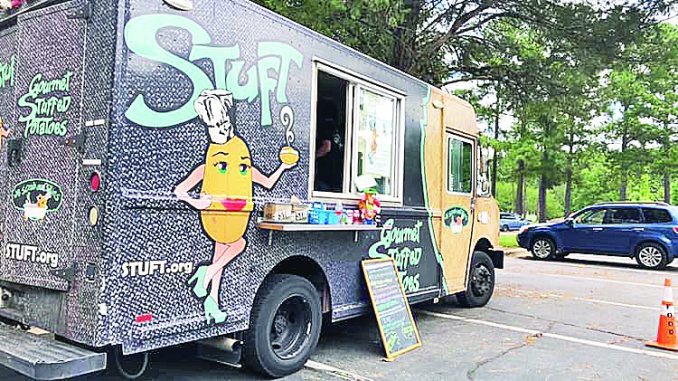
The food truck scene in and around the Triangle area has seen an explosion in popularity over the course of the past several years. Offering everything from barbeque, to lobster rolls, to Italian meatballs and even homemade falafel – there is no shortage of options to choose from. Unfortunately, like much of the restaurant industry, this vibrant sector of our local economy has taken a terrible hit due to COVID-19 restrictions.
Since Gov. Roy Cooper first issued the stay-at-home mandates in March, many food trucks like brick-and-mortar restaurants been forced to adapt and, in some cases, completely gone out of business. What used to be a built-in customer base consisting of downtown office workers, concert and festival goes, and late-night bar goers has all but dried up.
“When COVID first hit, we as a food truck didn’t have any restrictions, but the places we served like offices and bars had restrictions or were closed, so that is how it has impacted us,” says Christian Thompson, owner of Pork in the Road. He started his business just over three years ago, which also offers catering and is centered around a pork-inspired menu highlighting the fact that North Carolina is the second highest pork-producing state in the nation. Pork in the Road offers a few pork substitutes for kosher and vegetarian customers, but Thompson says, bacon and all of the other wonderful parts of the pig find their way into most every recipe.
Thompson says he didn’t have to lay off any employees but that he did have to cut back on the amount of workers he partnered with in his catering business because the events were postponed or canceled. He says that within the first two weeks of the original executive order, he lost $17,000 off event cancellations. “We were slated to do several summer weddings, some rehearsal dinners, and even a bar mitzvah this coming summer but everything was cancelled, which was pretty devastating.”
As food trucks hunt for customers that used to flock to them, they’re relying more on social media and word of mouth to advertise their locations and seek out a captive audience happy for a chance to sample new kinds of cuisine.
Getting’ Sauced in the City owner Patrick Gilliam and his wife Christina started their Italian food truck business in November 2017 after a combined 47 years in retail. Patrick is an ex-marine and says the couple made the decision to follow their dreams when they opened their restaurant on wheels. Over the last six months since the virus took hold, Sauced in the City has been updating their website with its various locations, which includes breweries like Fortnight Brewing in Cary, the Bearded Bee in Wendell, and Mason Jar Lager Company in Fuquay-Varina.
Gilliam’s overall revenue is down about 80% since before the pandemic, with the most recent month down around 67%. He says Homeowners Associations have been their lifeline over the last 6 months, as well as some catering on the side. “HOA’s have been our saving grace. When we first started going out to them back in April – people were not allowed to go out to eat anywhere so we would go setup at these HOA’s for a few hours and we could do $1k-$3k dollars in a shift.” Food trucks heading to neighborhoods are focusing more on dinner and kid-friendly options as a change of pace.
Gilliam says there is more work involved these days in order to make ends meet. “You just have to be willing to travel to make some of the money right now,” Gillam points out, citing an upcoming wedding on the coast he is planning to cater.
Other food truck operators have chosen an alternative strategy and instead of jumping from location to location are parked in a permanent spot where customers know they can count on them being there. Rob Henson, who run BBQ Proper, has been parked outside of the Earp’s Seafood Market in downtown Raleigh since early March. He already had business ties to the market so it made sense that he would use their location for his business. He says this year sales are down 40-50% due to COVID and he is doing about $2500/week now. In a normal year BBQ Proper would be at breweries, festivals, rodeos, swimming pools, corn mazes, apartment complexes and parties. “When all the festivals got canceled, we came here,” he says referring to Earp’s. “I don’t even take my truck out anymore. It saves money on fuel and tires.” Henson has ramped up his online offerings to include daily specials and also tapped into websites such as Streetfoodfinder.com and Foodtruck.pub
For now, the industry is learning to adapt. Thompson took over the lease at a Durham-based commissary kitchen where he leases space out to three or four other tenants who all have ties to the food industry. He shares the satellite kitchen with a few caterers and an entrepreneur specializing in farm to table at home meal kits. Gilliam has parked his truck outside liquor stores and gas stations, something he says he never thought he would do. “Liquor sales have been up 51% in the U.S. since the pandemic struck so we tapped into that crowd as just one example of some of the out of the box measures we have taken during these tough times.”



